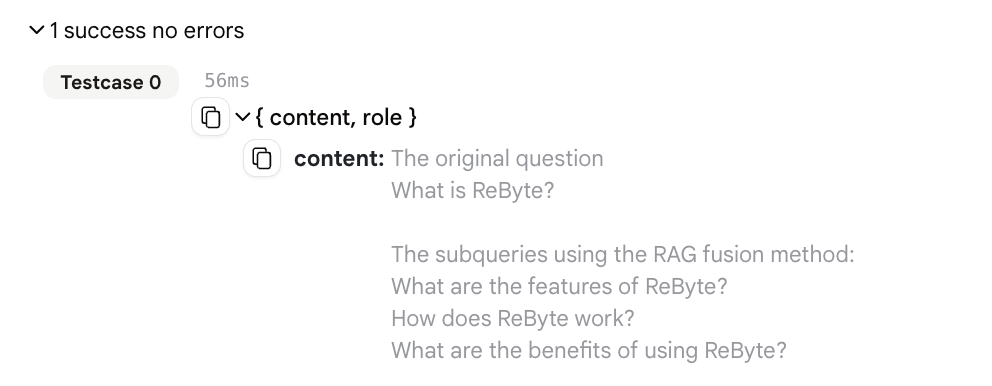Welcome to our comprehensive overview of query translation techniques in Retriever-Augmented Generation (RAG) pipelines. In this series, we've explored four innovative methods revolutionizing user query processing. These are Multi-Query Translation, RAG Fusion, Decomposition, and Step-Back Prompting. We'll demonstrate how these techniques can be implemented in ReByte, complete with agent and app examples.
1. Multi-Query Translation
Multi-Query Translation diversifies a user's query by rephrasing it into various forms. In ReByte, this is achieved using the "LLM-chat" action to generate multiple queries from a single user question.
This technique enhances the likelihood of retrieving relevant information, as each query version might align differently with the documents in the database.
For implementation, we use "Map-Reduce" and "Knowledge Search" actions to retrieve information for each query, followed by another "LLM-chat" action to summarize the results.

2. RAG Fusion
RAG Fusion, an extension of Multi-Query Translation, includes a crucial reciprocal rank fusion step. This method consolidates results from multiple queries into a single, optimized list, making it ideal for comprehensive information retrieval.
RAG Fusion is demonstrated in ReByte through a similar process of generating multiple queries and retrieving documents.

3. Decomposition
Decomposition addresses complex queries by breaking them into smaller sub-questions, each solved independently. This approach, demonstrated in ReByte, simplifies the retrieval process and allows for detailed responses.
Here, the "LLM-chat" action is used to generate sub-queries, which are then rocessed to form a comprehensive answer.

4. Step-Back Prompting
Step-Back Prompting abstracts a specific query into a more general one, broadening the scope of information retrieval. In ReByte, this method generates high-level questions from specific queries, facilitating the retrieval of a wider range of related information.
This technique is particularly effective in contexts where background information is as crucial as the query's specific details.

Agent Demo for Step-Back Prompting
App Demo for Step-Back Prompting
Conclusion
These query translation techniques form a robust toolkit in RAG systems, ensuring accurate, relevant, and comprehensive information retrieval. Multi-Query Translation and RAG Fusion expand search scope, Decomposition simplifies complex queries, and Step-Back Prompting elevates queries to a more abstract level. Stay tuned for further insights and advancements in query translation and RAG pipelines.
